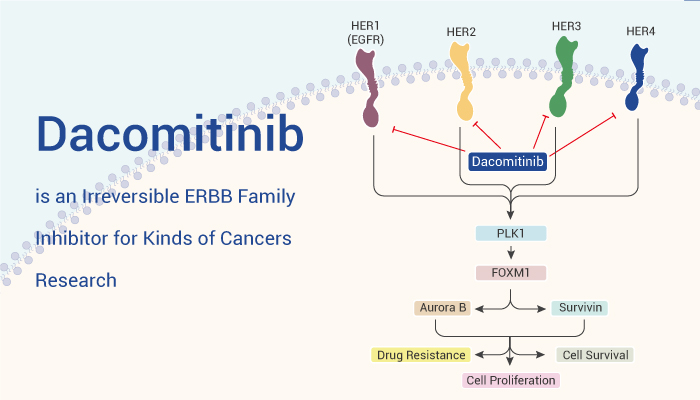Subclass I of the receptor tyrosine kinase (RTK) superfamily consists of the ERBB or epidermal growth factor (EGF) receptors. In humans, the family includes Her1 (EGFR, ERBB1), Her2 (ERBB2), Her3 (ERBB3), and Her4 (ERBB 4). All members have an extracellular ligand-binding region, a single membrane-spanning region and a cytoplasmic tyrosine-kinase-containing domain. The ERBB receptors are exist in various tissues of epithelial, mesenchymal and neuronal origin. ERBB protein family signaling is important for development. For example, ERBB-2 and ERBB-4 knockout mice die at midgestation leads to deficient cardiac function associated with a lack of myocardial ventricular trabeculation and display abnormal development of the peripheral nervous system. In ERBB-3 receptor mutant mice, they have less severe defects in the heart and thus are able to survive longer throughout embryogenesis. Meanwhile, Lack of Schwann cell maturation leads to degeneration of motor and sensory neurons. Furthermore, excessive ErbB signaling is associated with the development of a wide variety of types of solid tumor. ERBB-1 and ERBB-2 are found in many human cancers, and their excessive signaling may be critical factors in the development and malignancy of these tumors.
Dacomitinib (PF-00299804) is a second-generation, specific, irreversible and orally active inhibitor of ERBB family
Dacomitinib exhibits structural specificity for the catalytic domains of EGFR, ERBB2, and ERBB4 that has exhibited vigorous efficacy against some solid tumors. Therefore, Dacomitinib exhibits significant cytotoxic and cytostatic effects in cells expressing elevated levels of the Dacomitinib target receptors. Importantly, Dacomitinib exerts antitumor activity by inducing apoptosis and cell cycle arrest. Meanwhile, cells expressing lower levels of HER receptors were much less sensitive to Dacomitinib. What’s more, Dacomitinib is effective in metastatic non-small cell lung cancer (NSCLC) with EGFR exon 19 deletion or exon 21 L858R substitution mutations. In vivo, Dacomitinib inhibits the growth of HCC827 GFP xenografts. Pharmacodynamic effects of dacomitinib included decreased E-cadherin (E-cad) expression, reduction of EGFR and extracellular signal-regulated kinase (ERK) phosphorylation and reduced mitotic count. Dacomitinib also inhibits tumor growth in a chemotherapy-resistant xenograft and, when combined with chemotherapy in a sensitive xenograft, exhibited superior antitumor effects compared with individual treatments.
All in all, Dacomitinib is a specific and irreversible inhibitor of the ERBB family that exhibits anti-tumor activity.
Refenrences:
[1] Hynes NE, et, al. Nat Rev Cancer. 2005 May;5(5):341-54.
[2] Wu YL, et, al. Lancet Oncol. 2017 Nov;18(11):1454-1466.
